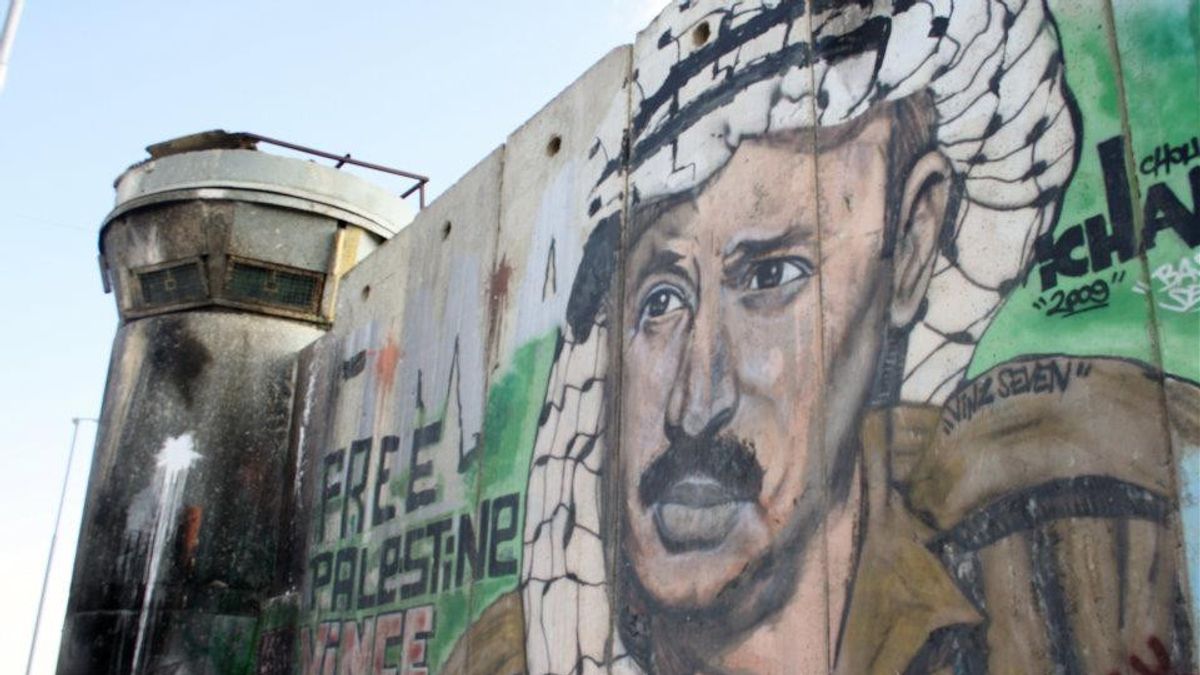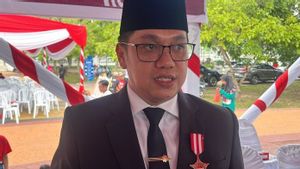JAKARTA - Yasser Arafat, a figure known as the leader and father of the Palestinian Freedom Organization, was born on August 24, 1929. He died tragically, surrounded in sad isolation. The deaths also marked the beginning of the end of a revolution that revived Palestinian national consciousness. A revolution that enlivens the spirit of the Palestinian people to determine their destiny in their own land.
Arafat's struggle to liberate Palestine is quite long. Starting around the 1950s, Arafat founded an organization called Fatah. The organization was founded to liberate Palestine with people's weapons. Under Arafat's leadership, Fatah was unlike any other Arab country.
Fatah has its own ideology, not even receiving assistance from Arab countries. Even so, Arafat received assistance from Kuwait and Qatar. The two countries Arafat considered as a country that sincerely gave him assistance. However, over time Arafat received assistance from two other countries: Sudan and Libya.
Subsequently, Arafat succeeded in uniting various organizations. In 1964, the Palestinian Freedom Organization (PLO) was founded. Fatah, under the PLO, has often launched attacks against Israel. These attacks are often repaid by Israel. However, unfortunately, most of the victims who attacked each other were civilians.
According to the New York Times, the shift between peace talks and acts of violence is a hallmark of Arafat's political life. In his emotional appeal for a Palestinian state at the United Nations (UN) General Assembly in 1974, Arafat wore a sarong while carrying an olive thread.
At the meeting the UN stated that the PLO was the only legitimate representative of Palestine. Some experts see Arafat's action with a sarong and olive as his way of conveying the message: Today I came with olives and weapons of freedom. Don't let the olives fall from this hand.

Until 1988, Arafat fervently rejected Israeli recognition, insisting on armed struggle. Peace path diplomacy is not in Arafat's dictionary. He chose diplomacy after his embrace with Iraqi President Saddam Hussein during the Persian Gulf war in 1991. His movement was politically humiliated. He also went bankrupt financially. Without power and influence, Arafat seemed to change course. He slowly entered the diplomatic route.
In September 1993, Arafat gained worldwide recognition by signing a limited peace treaty with Israel. The Arafat Declaration carries a number of principles that essentially provide mutual recognition and unravel the transition to Palestinian autonomy in parts of the West Bank and Gaza. The two regions have been under Israeli control since they won the Arab-Israeli war in 1867.
The culmination of secret negotiations in Oslo, the agreement was brokered by President Bill Clinton and closed with a stunning handshake between Israeli Prime Minister (PM) Yitzhak Rabin and Yasser Arafat on the lawn of the White House. The peace led Arafat and Israeli Prime Minister Yitzhak Rabin to receive the Nobel Peace Prize in 1994. The following year they signed a new agreement, Oslo II, which laid the groundwork for a series of peace agreements between the PLO and Israel.
The following years
Regardless of the best agreement and plan between the two parties, peace is always difficult to live by. Israel began major construction on the area claimed according to the decision in the Oslo Accords. Relations heated up when Yasser Arafat was re-elected as leader of the PLO in 1996 and Benjamin Netanyahu was elected prime minister of Israel. Netanyahu rejects Palestinian status and continues to build settlements. Israel also sees Arafat as not giving complete trust to Palestinian security groups. That is what keeps both parties moving away from the word peace.
In 2000, Arafat decided to reject the settlement offered under the Oslo agreement proposed by Israeli Prime Minister Ehud Barak. Israel admits that their proposal fulfills most of its previous demands. However, Arafat felt that the previous Palestinian demands had not been fulfilled. Arafat was later seen as failing to respond with his own proposal, which effectively weakened the US-brokered talks. Ehud Barak's offer continued to shift and ultimately failed to meet Palestinian needs.
After the failure, Ariel Sharon, then an opposition in Israel, visited the Jerusalem square outside the Al Aqsa Mosque in late September. Palestinians erupted in violent protests, sparking what has come to be called the second intifada. The action killed more than 900 Israelis and nearly three thousand Palestinians. The PLO became vulnerable to armed conflict.
In 2004, Arafat died. Before falling ill, Arafat was surrounded while in Ramallah. The siege was carried out by Israel under the command of Ariel Sharon and supported by US President George W. Bush. However, because his health continued to deteriorate, Israel allowed Arafat to seek treatment in France. His health continued to decline until he fell into a coma and on November 11, 2004, Arafat was pronounced dead.
Arafat left an ambiguous legacy. On the other hand, Arafat succeeded in creating a PLO-led movement and awareness of the Palestinian people for independence. Arafat also made the world aware of Palestine as a different entity. But on the other hand, Arafat left an authoritarian impression and only prioritized warfare. This is evidenced by the outbreak of various wars such as the Lebanon and Jordan wars. Arafat in his name as the struggle of the PLO for Palestinian freedom against Israel. However, until this moment, Palestine continues to lose its homeland.
The English, Chinese, Japanese, Arabic, and French versions are automatically generated by the AI. So there may still be inaccuracies in translating, please always see Indonesian as our main language. (system supported by DigitalSiber.id)









